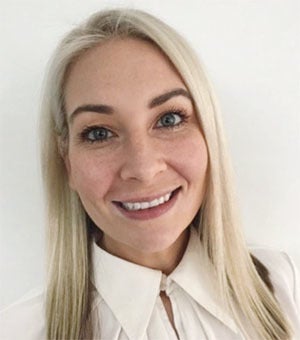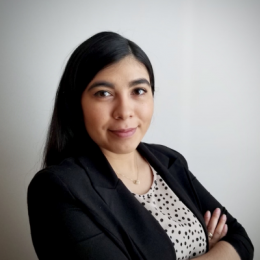
Julia Taylor
ASSISTANT GENERAL COUNSEL
CARNIVAL AUSTRALIA
SYDNEY, AUSTRALIA
An expected 10,000 delegates including world leaders, officials, and observers will make landfall in Papua New Guinea in November for the 2018 Asia Pacific Economic Cooperation (APEC) Summit. Presidents, prime ministers, and CEOs will engage in critical dialogues for the region and experience the rich culture of the island-nation — and the majority of them will do so from the comfort of a Carnival Australia cruise ship.
Julia Taylor, assistant general counsel of Carnival Australia, part of the world’s largest leisure company Carnival Corporation & plc., worked for nearly two years on the completion of a charter deal with the government of Papua New Guinea. Three of Carnival Australia’s cruise ships will act as floating hotels during the APEC Summit, providing accommodation for APEC participants and presenting a solution to the high volume of attendees and limited accommodations on land.
Taylor has been a world traveler since she was a child. Her family accompanied her father on his business trips, and she even attended elementary school in England. So, it seems natural that she would eventually work for a branch of the world’s largest leisure travel company. But for this assistant general counsel, it wasn’t the open seas that called her. It was the people. Collaborating with others to solve problems has always been a guiding factor in her career and is what drew her to law. Ultimately, this passion has allowed her to be successful in negotiating the charter between Carnival Australia and the Independent State of Papua New Guinea.
While her early passions included cooking and entertaining — she imagined a possible career in hotel management when she was younger — Taylor started off studying commerce for her bachelor’s degree. But she found that the mathematical focus (i.e., accounting and economics) took her away from the humanistic aspect she craved. “By the time I had changed majors for the third time, I thought, you know what? I think I might want to pursue law because listening to people’s stories and helping them find solutions really appeals to me. I liked the need to be a creative and lateral thinker to solve problems within a set of established rules,” Taylor recalls about her decision to finally major in commercial law.
But after graduation, Taylor found herself without prospects for a clerkship and discouraged. She remembers vividly thinking that without an internship at a top tier firm, she was never going to be a successful lawyer. But after finding an ad in the paper for a legal recruiter, she was referred to Bob Barraket, a well-connected entrepreneur and lawyer with over 30 years of practice experience. Taylor became Barraket’s personal assistant and paralegal and worked with him for a year and a half. She describes Barraket’s mentorship as “a kind of father-daughter relationship” where she learned much about the field and worked on interesting cases. One case in particular intrigued her. The Australian tax office was taking recovery action against one of its clients. During the case, Taylor worked closely with the lawyer representing the Federal Commissioner of Taxation, establishing a rapport to reach a settlement that satisfied both parties. The experience imbued her with just enough curiosity about the government side of the legal world that she couldn’t help but apply when she saw a job ad for a paralegal at the Australian Government Solicitors Office (part of the Attorney General’s Department).
After one of those interviews where neither side can stop talking, Taylor was offered the job and began work as part of the Sydney Tax Team. She found it to be an amazing experience, “really just once in a lifetime,” she reminisces. “We were involved in a lot of high profile cases, including ones that ended in the high court where we were representing the Federal Commissioner in cases of alleged tax avoidance.” But while it was an invaluable experience, Taylor quickly became aware that the environment was not one she could see herself in for the long term. Taylor felt that there was little opportunity for work-life balance, with every second feeling like it needed to be accounted for — even bathroom breaks. On top of that, Taylor felt that the culture was not personal enough. “I need to talk to people. I need to feel involved at the grassroots level,” she asserts.
Looking for an opportunity where she would be able to see her impact, Taylor took a job at Channel Ten — an Australian television station — as their assistant company secretary. She later became their corporate legal counsel. Taylor worked closely with the sports team, negotiating broadcast and production deals, and became the go-to person for any questions related to rights exploitation. With a heavy problem-solving component that focused on pushing the envelope with each broadcast, Taylor loved “getting her hands dirty.” For her, the best part was being able to come home at night and see the sponsor placements on TV that she orchestrated. She would watch a broadcast and know she was responsible for the positioning of a sponsor’s logo or products within a program. A particularly salient memory of hers from this time is negotiating the agreement to broadcast the Commonwealth Games in Delhi, India, part of which was having to figure out how to run cables through treetops in the jungle to make sure that the program would air uninterrupted.
However, after six years, there were a number of transitions in the company’s leadership, and Taylor decided to make a transition in her own life. Once again turning to job ads, one headline in particular caught her eye: “Come and work for the world’s leading vacation supplier!” Although she had never been on a cruise, Taylor was intrigued. So, she applied and got an interview. “I was one of the last people to be interviewed,” Taylor recalls, “They had interviewed about 28 people before me.” But it was Taylor’s ability to anticipate multiple high stress scenarios that made her stick out from the rest. The interviewers asked each of the applicants what they thought a typical day might be like. While previous interviewees responded with tasks that were firmly within the expected job description, Taylor immediately went to “putting out fires” and “dealing with matters from a wide range of practice areas — akin to a general practitioner of medicine who sees multiple patients with multiple issues each day. Privacy, intellectual property, antitrust matters, multijurisdictional compliance matters, regulatory and government relations, and all manner of transactional work, amongst others,” were a few topics she mentioned without missing a beat. The interviewers were impressed, and she started two weeks later, in January 2014.
Now, after four years with Carnival Australia, Taylor continues to sharpen her problem-solving skills. With the APEC charter, the biggest challenge was not only the number of stakeholders, but that in addition to chartering the ships, the Papua New Guinea Government needed to upgrade their port infrastructure at the same time. Taylor was “dealing with the PNG Port corporation, the PNG government ministers and their delegates, the lawyer on the other side, and business partners from Carnival — both in Australia and in the United States.” Taylor quickly built a rapport with the maritime lawyer on the other side. They said to each other, “We know what needs to be achieved; let’s do it in a collaborative way.” Taylor comments, “It just made the process so much easier. It didn’t mean in any way that we were not doing the best job for our clients.” Her key to reaching an agreement is remembering that “it’s also about being a reasonable negotiator and not pushing for stuff that really doesn’t matter in the end. It’s all about focusing your time on properly and fairly dealing with the real risks that could transpire.” Additionally, she maintains that transparency is a key factor. When possible, keep all parties in the loop, even if you occasionally doubt they need to know, the answer is they do. Taylor explains that this allows you to avoid confusion and, in the end, results in efficiency and commerciality on both sides. When parties feel equally involved and understood, they are more likely to agree on a workable way forward. Being open from the first interaction also demonstrates real collaborative intent, which can go a long way when, during the term of the agreement, you may need to ask a counter-party to perform a task that isn’t necessarily one they are contractually obliged to perform.
After two years of negotiations, all parties signed the charter. While this is not the first time Carnival Australia has supplied ships for a conference (the Pacific Jewel was chartered for the Small Island Developing States Summit in 2014), the charter of three ships, along with the involvement of such a large number of stakeholders, ranging from government ministers and port authorities to lawyers and business partners, proved to be a daunting task. But Taylor’s skill as a reasonable negotiator, combined with her passion for getting to the grassroots of any transaction, enabled her to strike a favorable deal so that both parties could begin on the delivery aspect as soon as possible. From this experience, and others, she has developed a network of relationships that she can call upon during future negotiations. Reflecting on what made this endeavor successful, Taylor believes that in-house counsel can add tremendous value by being truly in-tune with a business’ overarching strategy, leading to an ability to “recognize quickly what needs to be achieved, and how to get there.”
But Taylor’s role as assistant general counsel extends far beyond negotiating contracts. Now that the charter has been signed, she will be returning to Papua New Guinea for the APEC Summit as a liaison between delegates and the ship, as well as a representative of P&O and Princess Cruises. Back at headquarters, she feels like she is a part of not only her legal team but the multiple other departments that also make up Carnival Australia. She regularly attends other department’s meetings to stay up to date on their projects and needs. It not only keeps her informed but allows her to anticipate solutions. “I’ll attend a quarterly managers’ update and feel proud when I’ve had a valuable part to play in nearly all of the commercial projects mentioned,” Taylor says.
It is important to Taylor that the legal department demonstrates its value to the other departments. “I’ve heard a lot from other in-house lawyers about their business partners not actually knowing what the legal team does day to day,” Taylor explains. So, she now focuses on educating the business units and others on how their in-house legal team can be a valuable resource for them. The ultimate goal is for the business units to want the legal team at the table as early as possible. Part of this education is face-to-face trainings and panel discussions. The legal team holds regular training sessions to empower people from all departments to have basic legal knowledge so that they can make good decisions at the early stages of their deals and claims. In this way, the legal department — which is a mighty team of five out of 350 staff — can lend its skills to more complex issues.
In addition to the training sessions, which utilize innovative apps such as Zeetings to run live polling and incorporate real case examples, Carnival Australia’s legal team has a communal email address. Taylor explains, “So, we get a whole bunch of different requests that come through… then whoever is available within the team, even the litigators, will reply and say, ‘I’ll take this one.’ And so, from a business point of view, we’ve made ourselves accessible. Being able to provide that early guidance is important as it lends itself to the achievement of a higher level of compliance.” Since these initiatives, the legal team has seen an increase in their involvement in business affairs. “It gives us a lot more job satisfaction actually to feel wanted and to feel like we’re adding real value to the achievement of the end product,” Taylor adds.
The opportunity to see her impact is one of the reasons that Taylor loves working for Carnival Australia. Reflecting on her career, she notes, “Again, like watching TV and seeing the product in my lounge room at home, I just love to see the ships sailing through the harbor and coming into port.” From her traveling youngster days, to her uncertainties after law school, to successfully navigating a multinational charter, Taylor’s journey has had its ups and downs. But her passion for problem solving and connecting with others has guided her through it all.
Getting to know… Julia Taylor
WHAT DOES YOUR TYPICAL WEEKEND LOOK LIKE?
I’ve got two sons aged five and two, so our Saturdays are dedicated to sports and outdoor activities. We go to swimming on Saturdays, soccer on Sundays, and tennis on Thursdays. Young engineers class (Lego building) is Monday at lunchtime. One of our favorite things to do as a family is get up super early and go to the beach, where the adults sip espressos on a picnic rug on the sand, and the kids search for unusual things within the rock pools. If they find a crab or an octopus, it’s a good day!
DO YOU HAVE ANY HOBBIES?
I love cooking, holding dinner parties, and collecting wine. My husband is a builder, and after he built our house, he built two rooms under it. One is a wine cellar for me, complete with a tasting area, and the other is a display room for his Nike Air Jordans (he only collects 5’s and has them in every color).
IF YOU COULD HOST A DINNER PARTY WITH ANYONE, LIVING OR DEAD, WHO WOULD YOU INVITE? AND WHAT WOULD YOU COOK?
OK, it’s a big one! Imagine the late-night music and laughs though: Ricky Gervais, Michael Jackson, Amy Winehouse, Hillary Clinton, Liz Lemon (in character), Leonardo DiCaprio, Prince Harry, Steven Hawking, Walt Disney, Michael Jordan, and my husband and sister.
I’d have a Christmas in July theme and make roast and stuffed turkey, duck fat roast potatoes, cauliflower cheese, steamed greens, and a huge expensive cheese platter and Australian red wine for dessert.




